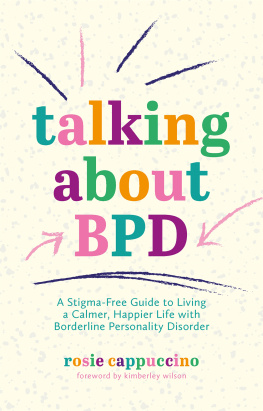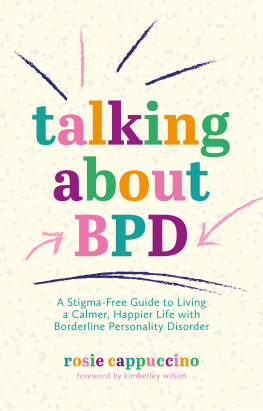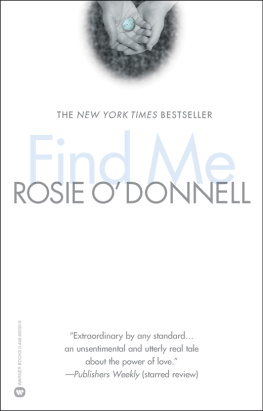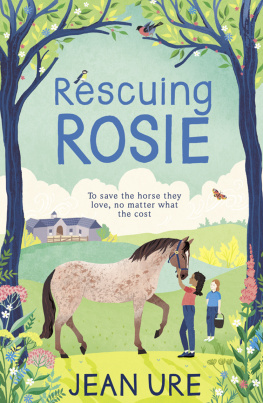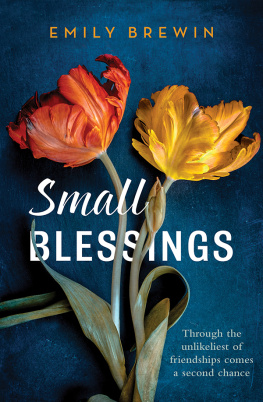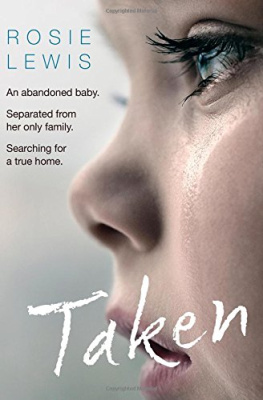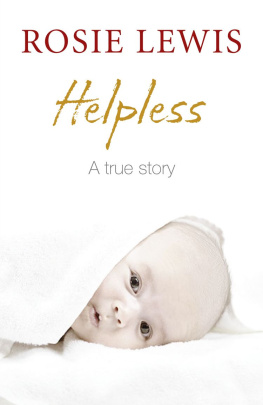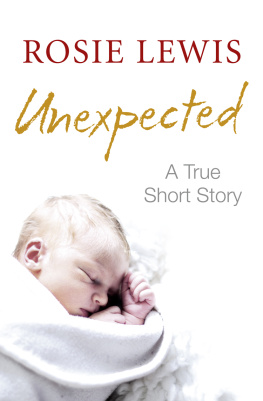Contents
Page list

of related interest
The Reality of Recovery in Personality Disorder
Heather Castillo
ISBN 978 1 84905 605 2
e ISBN 978 1 78450 071 9
Hell Yeah Self-Care!
A Trauma-Informed Workbook
Alex Iantaffi and Meg-John Barker
ISBN 978 1 78775 245 0
e ISBN 978 1 78775 246 7
What I Do to Get Through
How to Run, Swim, Cycle, Sew, or Sing Your Way Through Depression
Edited by Olivia Sagan and James Withey
Foreword by Cathy Rentzenbrink
ISBN 978 1 78775 298 6
e ISBN 978 1 78775 299 3
Unlock Your Resilience
Strategies for Dealing with Lifes Challenges
Stephanie Azri
Foreword by Rachel Kelly
ISBN 978 1 78775 102 6
e ISBN 978 1 78775 103 3
Were All Mad Here
The No-Nonsense Guide to Living with Social Anxiety
Claire Eastham
Foreword by Natasha Devon MBE
ISBN 978 1 78592 082 0
e ISBN 978 1 78450 343 7
Living at the Speed of Light
Navigating Life with Bipolar Disorder, from Depression to Mania and Everything in Between
Katie Conibear
Foreword by Calum Harris, Lorraine Gillies and Aditya Sharma, National Specialist Adolescent Mood Disorders Service, CNTW NHS Foundation Trust
ISBN 978 1 78775 557 4
e ISBN 978 1 78775 558 1
Talking
About
BPD
A Stigma-Free Guide to Living
a Calmer, Happier Life with
Borderline Personality Disorder
Rosie Cappuccino
Foreword by Kimberley Wilson

First published in Great Britain in 2022 by Jessica Kingsley Publishers
An Hachette Company
Copyright Rosie Cappuccino 2022
Foreword Kimberley Wilson 2022
The right of Rosie Cappuccino to be identified as the Author of the Work has been asserted by her in accordance with the Copyright, Designs and Patents Act 1988.
All rights reserved. No part of this publication may be reproduced, stored in a retrieval system, or transmitted, in any form or by any means without the prior written permission of the publisher, nor be otherwise circulated in any form of binding or cover other than that in which it is published and without a similar condition being imposed on the subsequent purchaser.
A CIP catalogue record for this title is available from the British Library and the Library of Congress
ISBN 978 1 78775 825 4
e ISBN 978 1 78775 826 1
Jessica Kingsley Publishers policy is to use papers that are natural, renewable and recyclable products and made from wood grown in sustainable forests. The logging and manufacturing processes are expected to conform to the environmental regulations of the country of origin.
Jessica Kingsley Publishers
Carmelite House
50 Victoria Embankment
London EC4Y 0DZ
www.jkp.com
To every person with a diagnosis of borderline personality disorder or who relates to this diagnosis. If you relate to the fear, shame and loneliness described in this book, I hope it brings you validation, comfort and confidence.
Contents
Disclaimer
This book is not intended as medical advice. It is not a substitute for professional help. It is not written by a doctor, but by a person with lived experience. Always ask a doctor for medical advice and seek emergency help if in immediate danger.
Trigger warning
This book mentions abuse (emotional abuse, verbal abuse, child abuse, child neglect, abusive relationships and toxic relationships), anxiety and panic attacks, depression, dissociation, intrusive thoughts, self-harm, suicide (suicidal ideation and suicidal thoughts) and trauma (post-traumatic stress disorder, PTSD).
The following are also mentioned in passing: abuse (physical abuse, absent parent), alcohol, anger issues, bipolar disorder, blood, bullying, death, depersonalization disorder, drugs, eating disorder, hallucinations and delusions, homophobia and hate crimes, hospitalization, manipulation, misogyny, obsessive-compulsive disorder (OCD), rape and sexual assault, schizophrenia and transphobia.
Foreword
We should not tell people that its good to talk about a mental health condition without actively ensuring that the environment is one in which it is safe for them to do so. Too often for people with a diagnosis of borderline personality disorder (BPD) the social environment is not one that is conducive to them being open about their diagnosis; such a disclosure is still too often met with out-dated stereotypes and harmful caricatures.
I met Rosie when she generously agreed to be a guest on my podcast as part of a series I recorded on BPD. Having trained in dialectical behaviour therapy (DBT) early in my career, I wanted to lend my voice to creating a more thoughtful and compassionate public conversation about what it means to have BPD. During the discussion Rosie described experiences of discrimination from both friends and professionals that will be familiar to many people facing this diagnosis.
Dehumanizing judgements from the outside world dont just make disclosing BPD fraught with difficulty and risk; they can also undermine a persons internal experience. On a hot summers day, a new client explained that they felt anxious about telling me that they were feeling uncomfortably warm in my consulting room because, Its manipulative of me to say that I am hot because then that puts pressure on you to turn the air conditioning on. Comments and beliefs like these highlight how the general portrayal of BPD is so toxic that simply asking for basic needs to be met can leave people wondering whether they are causing harm. It is deeply saddening to be confronted with someone who has internalized the stereotypes of this diagnosis. Their hurt is palpable. As is the loneliness of being so negatively characterized and misunderstood. I hope we can all agree that anyone facing a mental health diagnosis deserves better than this.
So, are things getting better? Well, as is so often the case, its a mixed picture. On the one hand, social media has enabled and empowered those with lived experience of BPD to share their own stories, build supportive communities and challenge the dominant illness narratives. However, it is true that there are, sadly, still some professionals who hold and perpetuate stigmatizing views and, as uncomfortable as this is to acknowledge, it is important that we do not turn a blind eye to this reality. To do so would be a disservice to the profession and the people we are trying to support. It is crucial that mental health professionals are deliberate in working to undo the stigmatized (and often misogynistic) representations of BPD, and it is for this reason that I hope professionals, as well as individuals with BPD and their friends and family, read this book. Yes, as health professionals we are human, and as humans we are susceptible to holding, perpetuating or failing to challenge biases that might negatively affect those we work with. However, as health professionals we have an ethical responsibility to seek out and address these biases so that we may offer the best care possible. As some of Rosies own examples (see ) attest, a careless, off-hand comment from a health professional can create lasting wounds. Whilst none of us can ever be perfect, I believe we should all aim to be better.
And we get better by listening. Too often we are keen to speak on behalf of those with a diagnosis without making space for their voices, without really listening. But the positive and accurate representation of people with a BPD diagnosis is important for all of us: patients, public, professionals.

